Maine Last Will and Testament Form
A Maine will is a document that contains the last wishes of its creator (the testator) and directs precisely how their estate will be used in the event of their death. As a safety measure, it’s strongly suggested to create a valid will even when you do not have a lot of assets.
Download a fillable and printable Maine last will and testament template to fill it out yourself or use our document creator with detailed instructions that accompany every writing step.
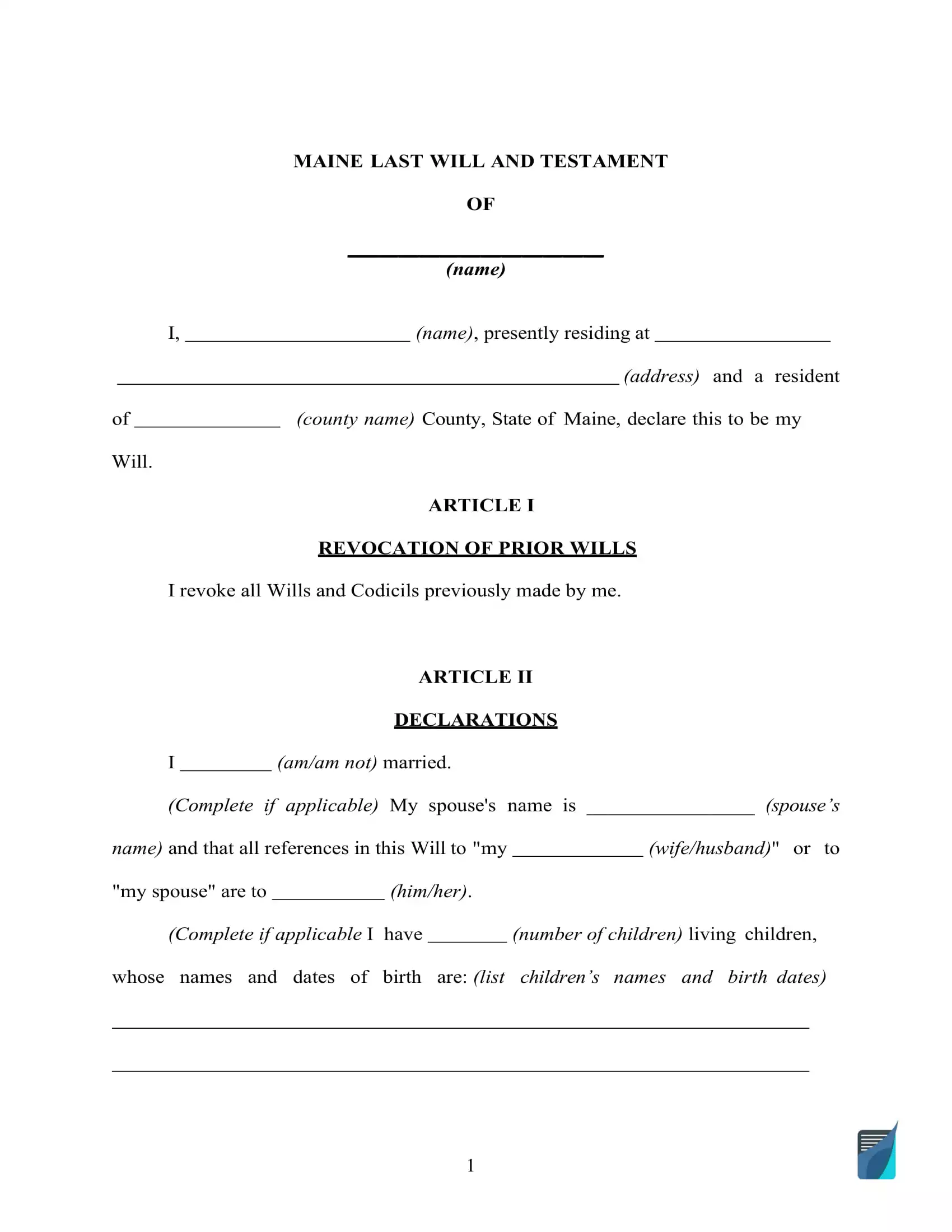
Build Your Document
Answer a few simple questions to make your document in minutes
Save and Print
Save progress and finish on any device, download and print anytime
Sign and Use
Your valid, lawyer-approved document is ready
Maine Laws and Requirements Regarding Wills
| Requirements | State laws | |
| Statutes | Title 18-C, Article 2 – Intestacy, Wills and Donative Transfers; Part 5 – Wills | |
| Definitions | §1-201. Definitions | |
| Signing requirement | Two witnesses | §2-502. Execution; holographic wills |
| Age of testator | 18 or older | §2-501. Who may make a will |
| Age of witnesses | 18 or older | §2-504. Who may witness a will |
| Self-proving wills | Allowed | §2-503. Self-proved will |
| Handwritten wills | Recognized if meeting certain conditions | §2-502. Execution; holographic wills |
| Oral wills | Not recognized | |
| Holographic wills | Recognized if meeting certain conditions | |
How to Write a Last Will in Maine
Make sure you have familiarized yourself with the laws and requirements from the table above and the state’s statute before writing a will.
1. Think about your alternatives. Decide whether you would like to seek the services of attorneys or prepare your last will on your own (either by using a free last will and testament template or a step-by-step document software we provide).
2. Indicate your details (as a testator). Fill in your full legal name and address (the city, county, and state of residence) to ascertain the testator of the last will. Reread the remaining portion of the section, including the details you’ve entered along with the “Expenses and Taxes” paragraph.
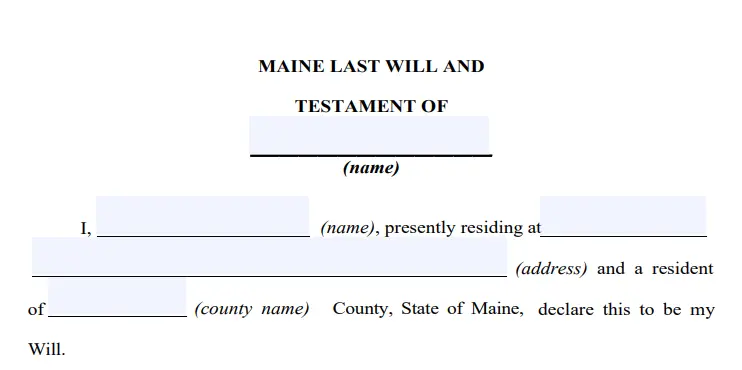
3. Indicate the executor. In this section, you define who’ll carry out your will by entering their full name, as well as their city, county, and state of residence. The vast majority of states have special restrictions associated with out-of-state (nonresident) executors and representatives. Hence, it is advised to appoint a person who resides in the same state as you.
Also, as an assurance, you can select a substitute executor of the will. That way, you’ll be able to make sure that, even if the initially chosen executor can’t perform their duties, there’s another dependable person you can count on.
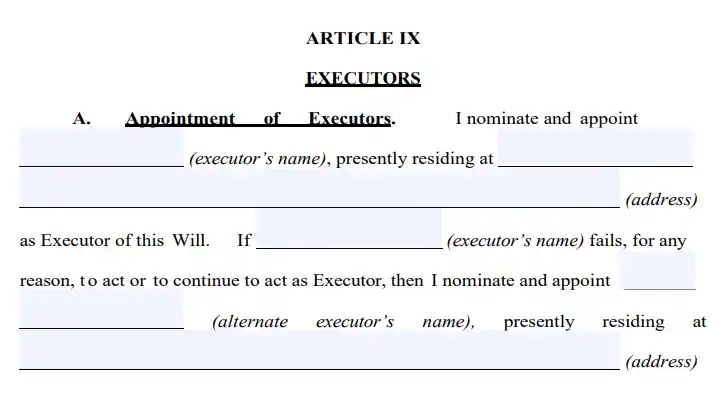
4. Choose the guardian (optional). It is possible to choose a trusted person as a legal guardian in case you have underage or dependent children that must be taken care of. In case there are no directions pertaining to who exactly should take care of your kids, the guardian will be selected by the court.
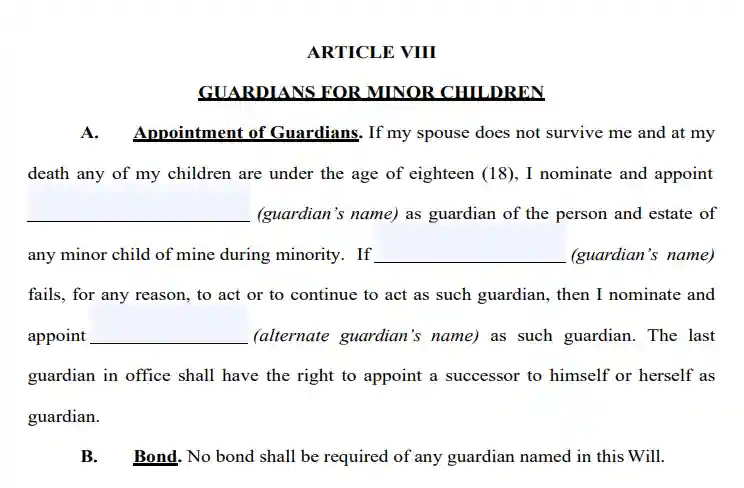
5. Indicate your beneficiaries. Now you should indicate those who are going to inherit your estate. For each named beneficiary, fill out these details: their full legal name, address, and how they are related to you. You don’t have to be related to the person to select them as your beneficiary, so your friends or even nonprofit organizations can be chosen here. Also, if you have a revocable trust, you can create a pour-over will and make that trust your beneficiary. That will transfer all the property that’s still not there upon your death.
6. Distribute your property. List your possessions and explain how you would like to distribute them among your beneficiaries if you’ve got something under consideration besides splitting them equally.
These assets can include money for unpaid arrears, realty, shares, business control, cash, and any tangible things of monetary value that count among your possessions. You can also indicate who will get to take care of your pets after you’re gone.
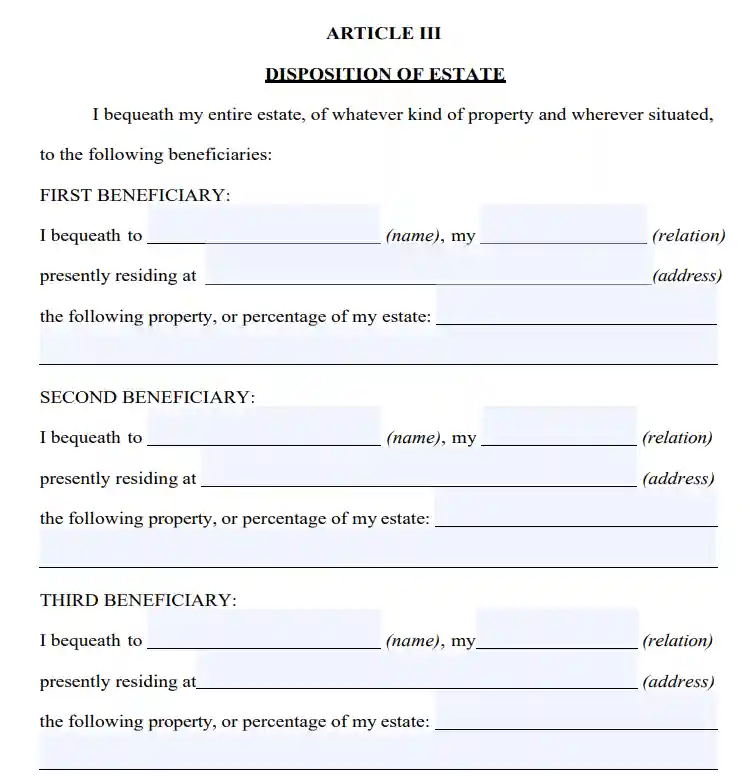
7. Ask witnesses to finalize the document. Maine Probate Code (§2-502) specifies that no less than two witnesses must sign a last will so that it is regarded as valid. You’ll be able to appoint someone as a witness provided that they’re older than 18 years and are disinterested in the bequest.
At this point, you (and your two witnesses) have to sign the paper after writing your full legal addresses and names. After that, make sure you look over each section thoroughly prior to finalizing the matter to check if everything’s in order.
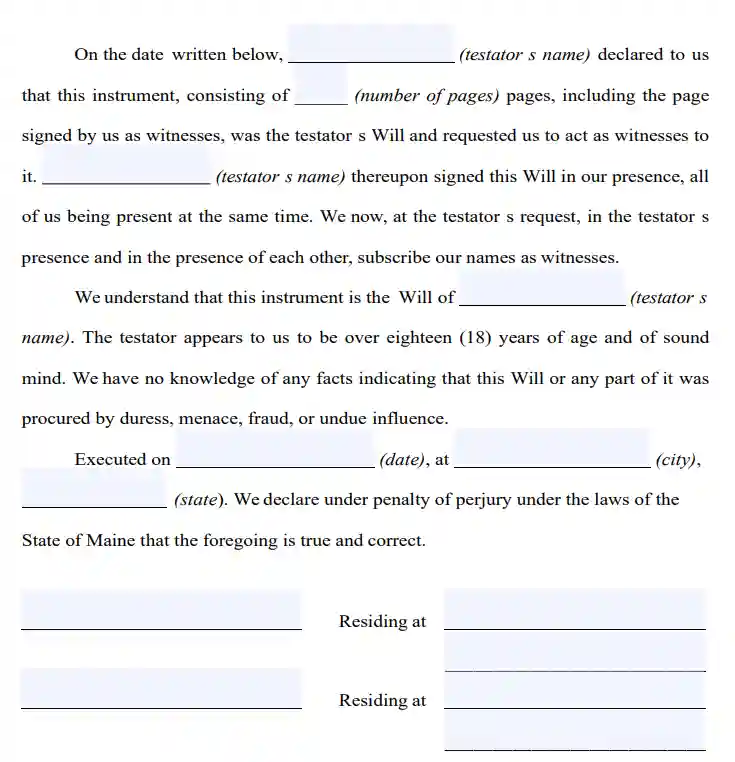
Make a Legal Maine Last Will and Testament
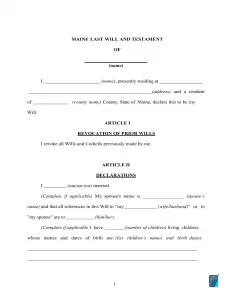

Frequently Asked Questions
Is will notarization needed by Maine law?
In Maine, it’s not necessary to notarize your will. However, in case you want to attach a self-proving affidavit to your last will, you will have to notarize it. Making your will self-proved could be a great idea because it quickens the probate and grants another layer of security if the will’s validity is questioned.
What is testamentary capacity?
Testamentary capacity is used to describe the testator’s (the individual creating the last will) legal and mental capability (sound mind) to write and alter their last will.
There’s a chance you might be regarded as lacking testamentary capacity in case you’re underage or have dementia, senility, insanity, or a similar mental illness that doesn’t let you to realize your assets’ value, who your heirs are, what a will is, along with the interrelationship of these points. Also, in Maine, an emancipated minor can write a last will.
Can you exclude your children or spouse from a last will and testament?
In Maine, you cannot disinherit your spouse. Even if you do state so explicitly in your will, a surviving spouse has the right to take an elective share (§2-202), which is 50% of the augmented estate of the decedent.
As for the children or any other family members, you can disinherit them if you state your intention to do so clearly in the will. For more information, see §2-302.
In Maine, am I allowed to change a typewritten will after signing it?
Yes, you are allowed to revise it by using a codicil. Situations when you should consider changing your last will include childbirth, adoption, marriage, divorce, real estate purchase or sale, etc.
If there are a lot of things that you want to change, it might be better to revoke the will and create a new one.
Is a handwritten will legal in Maine?
In some instances, the state of Maine accepts handwritten wills (§2-502. Execution; holographic wills). A holographic will is one that is written by the testator’s (in their handwriting) but not witnessed.
| Related documents | Times when you could want to have one |
| Codicil | You would like to make a single or a few slight changes to your will. |
| Self-proving affidavit | You would like to save time and money for your witnesses. |
| Living will | You would like to declare your wishes regarding the end-of-life medical treatment and life-prolonging procedures. |
| Living trust | You want to skip probate by having your property in a trust. |
